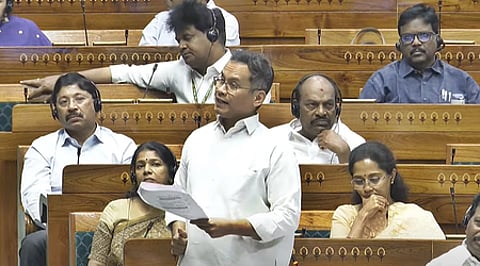

Congress MP Gaurav Gogoi launched a scathing attack on the BJP-led government in the Lok Sabha on Wednesday after Union Minority Affairs Minister Kiren Rijiju tabled the Waqf Amendment Bill. Gogoi accused the government of attempting to "defame and disenfranchise minorities" and staging what he described as a "4D assault on the Constitution"—diluting the Constitution, defaming minorities, disenfranchising them, and dividing Indian society.
Gogoi began by expressing concerns over the government's intentions, stating, "Today, they have their eyes on the land of a particular community; tomorrow, they will target the land of other minorities in society."
The Congress leader also raised concerns over a controversial provision in the bill that states only a Muslim who has been practicing the faith for at least five years can make donations. Criticizing the clause, he said it was disturbing that the government had taken it upon itself to issue "religious certificates" to individuals.
"It is a sad situation when the government decides who qualifies as a practicing Muslim," he remarked. "Will they apply the same rule to people of other religions? Why is this requirement being imposed only on Muslims? Why is the government interfering in religious matters?"
During his speech, Gogoi accused Minister Rijiju of making misleading statements about the bill and the role of previous governments. This remark prompted a reprimand from Speaker Om Birla. He also pointed out that the Minority Affairs Ministry had not mentioned the bill in any of the four meetings of its parliamentary committee in 2023, questioning the sudden urgency behind the amendments.
Rijiju had questioned the UPA government’s 2013 amendments to the Waqf Act. He questioned the powers granted under Section 108, arguing that they gave Waqf an overriding effect over all other laws, which he deemed unacceptable.
Rijiju pointed out three key changes made in 2013, just before the 2014 Lok Sabha elections, raising concerns over their implications. He pointed out that the UPA’s amendment allowed Sikhs, Hindus, and Parsis to create Waqf properties, despite Waqf traditionally being established in the name of Allah.
Additionally, he alleged that the UPA government made Waqf boards exclusive to specific communities, restricting Shia boards to Shias and Sunni boards to Sunnis.
Rijiju further accused the UPA government of denotifying 123 properties—including the CGO Complex and the Parliament building—and transferring them to the Delhi Waqf Board. He claimed that had the Modi government not intervened, more government properties could have been lost.
"A legal battle over these properties had been ongoing since 1970. Despite the case being in court, the UPA government arbitrarily transferred them to the Delhi Waqf Board. If we had not introduced this amendment, even this very Parliament building could have been claimed as Waqf property," he asserted.
Rijiju said that the bill does not interfere with any religious system, institution, or practice. He stated that the amendments solely deal with property management and have no impact on mosques, temples, or other religious sites.
"Waqf properties are managed by the Waqf Board and the Mutawalli. If someone fails to understand this distinction or deliberately ignores it, I have no solution for that," he said.
Alongside the Waqf Amendment Bill, 2025, Rijiju also introduced the Mussalman Wakf (Repeal) Bill, 2024, for consideration.
According to Gogoi, the bill was not just about administrative changes but a deliberate effort to weaken constitutional protections for minorities. He alleged that the government had its sights set on one community’s land today but could target others in the future.
"This is not about reforms; this is a calculated attempt to alter the electoral process and create divisions in society," he stated, dismissing Rijiju’s argument that the bill aimed to modernize Waqf laws.
He further accused the BJP of using the Waqf bill as a political smokescreen, citing recent incidents in BJP-ruled states where Muslims were allegedly not allowed to offer Eid prayers in public spaces.
Gogoi also criticized the Joint Parliamentary Committee (JPC) that was tasked with reviewing the Waqf amendments. He claimed that the committee, led by a BJP MP, routinely disregarded opposition members’ views. Over six months of meetings, 66 proposed changes were discussed—44 of which were suggested by the opposition and rejected outright, while 23 came from the BJP and its allies, of which 14 were accepted by the government in February.
Describing the committee’s functioning as unprecedented, Gogoi said there was no clause-by-clause discussion, and many of the stakeholders invited to speak had no direct connection to Waqf boards. Opposition MPs were further angered when their dissent notes were excluded from the final report, only to be reinstated later after protests.
"I have never seen a JPC operate in this manner before," Gogoi stated, arguing that the process was unfair and lacked transparency.
(With inputs from Agencies)